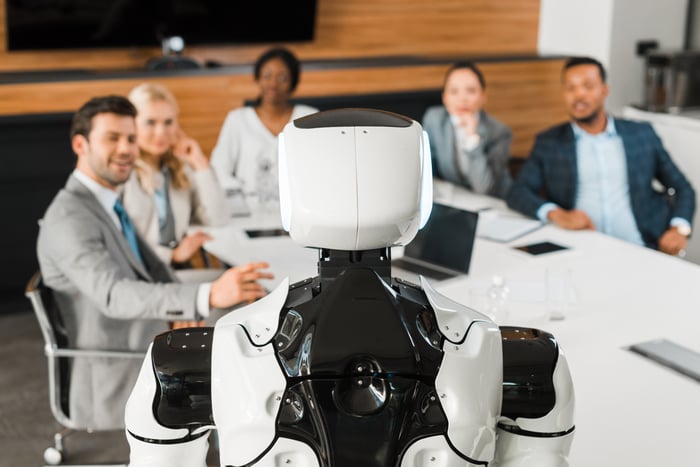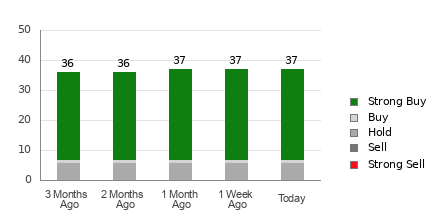Tesla (NASDAQ: TSLA) recently disclosed its underwhelming first-quarter results, as a decline in electric vehicle (EV) sales weighed down the company’s financial performance. Despite a 9% reduction in total deliveries and a 13% dip in automotive revenue to $17.4 billion, with an overall revenue decrease of 9% to $21.3 billion, earnings per share plummeting by 47% to $0.45, and cash outflows amounting to $2.5 billion, Tesla’s stock surged by 12% following the announcement.
The surge in Tesla’s stock price came after CEO Elon Musk reframed the company’s narrative for the future. Musk proclaimed that Tesla should be regarded as an artificial intelligence (AI) or robotics company, dismissing the traditional auto manufacturer label as inadequate. He further emphasized that if investors doubted Tesla’s ability to achieve autonomy, they should reconsider their investment in the company.
Tesla’s Future in AI Robotics
During Tesla’s first-quarter earnings call, Musk unveiled his vision of Tesla as an AI-based robotics enterprise, particularly focusing on autonomous vehicles. Tesla’s autonomous driving technology, FSD V12, has been activated in approximately 1.8 million vehicles on the roads, with nearly half of their drivers utilizing the feature.
Musk envisions a future where Tesla develops a substantial fleet of robotaxis or cybercabs, incorporating a groundbreaking ‘unboxed’ manufacturing approach to drastically reduce production costs. Tesla intends to reveal its robotaxi strategy in a significant presentation scheduled for August.
Exploiting the substantial computing power within Tesla vehicles, Musk plans to leverage the idle time of these cars for distributed inference. This concept envisions utilizing Tesla vehicles to execute AI models when not in operation, forecasting immense potential with a fleet of 100 million Tesla vehicles worldwide.
To contextualize this concept, Musk drew parallels with Amazon’s cloud service business, AWS, highlighting the unexpected success that the sector delivered for Amazon beyond its core online book-selling operations.
Yet, Musk’s distributed inference concept raises pertinent queries concerning ownership, energy-intensive AI computing requirements, and the financial sustainability of such an endeavor. The implementation of a Tesla-owned robotaxi fleet could address these concerns, albeit urban environments where robotaxis excel might present challenges due to potentially uncompetitive electricity prices.
Alongside its foray into AI robotics, Tesla is developing a humanoid robot named Optimus. Musk predicts that these robots will perform essential tasks within Tesla’s factories by the year-end and could potentially be commercialized by the close of 2025. Musk even speculated that Optimus might eclipse all other Tesla ventures combined in terms of value.

Image source: Getty Images.
Musk’s Strategic Vision
Elon Musk’s assertion is clear: perceiving Tesla solely as an automotive company might not position it favorably for investors. With a forward earnings multiple exceeding 55 and a sales multiple over 5, Tesla’s valuations surpass those of traditional automakers like Ford and General Motors. Moreover, emerging EV manufacturers have encountered challenges turning profits.
Nonetheless, if Tesla successfully morphs into an AI robotics entity, vast opportunities could unfold. Investing in Tesla transcends EVs; it embodies faith in Musk’s futuristic outlook. While not all of his innovative ideas might materialize, a significant portion yielding results could propel the stock to a profitable path.
Having retraced over 40% from recent peaks, the current juncture might present an opportune moment for investors to explore Tesla’s AI robotics trajectory under Musk’s leadership.
Conclusion
Elon Musk’s audacious pivot of Tesla from a conventional auto manufacturer to an avant-garde AI robotics entity marks a pivotal moment for the company. As the industry anticipates Tesla’s evolution in autonomous driving and robotics, investors are poised to consider the transformative potential that Musk’s visionary roadmap heralds.
Ultimately, Tesla’s destiny as an AI robotics purveyor, under Musk’s dynamic stewardship, beckons investors to contemplate a future where innovation and technology converge to sculpt the automotive landscape unlike ever before.



